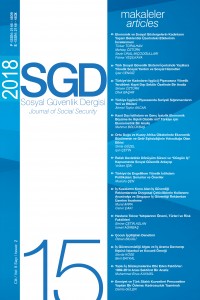Öz
Türkiye’de kadınların işgücüne katılım ve istihdam oranlarının oldukça düşük
olduğu ve kayıt dışı ekonomide yoğun
şekilde yer aldıkları bilinmektedir. Özellikle son
yıllarda kayıt dışı ekonomi ile
verilen mücadele sonucunda kayıt dışı istihdam oranlarında ciddi bir düşüş gözlenmektedir. Ancak Türkiye’de
özellikle kadınların kayıt dışı sektördeki yerini detaylı şekilde inceleyen
araştırmalar bulunmamaktadır. Bu çalışmanın amacı Türkiye’de kadınların kayıt dışı sektördeki yerinin ve
tercihlerinin tespit edilmesidir. Bu amaçla TÜİK’ten elde edilen 2015 yılı Hanehalkı Bütçe Anketleri kullanılmıştır.
Elde edilen sonuçlar hanehalkı ve bireysel sosyo-ekonomik faktörlerin
kadınların çalışma ve kayıt dışı çalışma tercihleri üzerinde belirleyici
olduğuna işaret etmektedir.
Anahtar Kelimeler
Kayıt dışı istihdam kadın istihdamı kadın emeği lojistik regresyon
Kaynakça
- Andersen, L. E., ve Muriel, B. (2007). Informality and Productivity in Bolivia: A Gender Differentiated Empirical Analysis (No 07/2007). Institute for Advanced Development Studies.
- Bangasser, P. E. (2000). The ILO and the Informal Sector: An Institutional History. Geneva: ILO.
- Çakır, Ö. (2008). Türkiye′de Kadının Çalışma Yaşamından Dışlanması. Erciyes Üniversitesi İktisadi ve İdari Bilimler Fakültesi Dergisi. (31). s. 25 - 47.
- Dayioğlu, M. (2000). Labor Force Participation of Women in Turkey. Gender and Identity Construction: Women of Central Asia the Caucaus and Turkey. Acar, F. ve Ayata, G.A. (Ed.). Leiden, Brill.
- Dedeoğlu, S. (2000). Toplumsal Cinsiyet Rolleri Açısından Türkiye’de Aile ve Kadın Emeği. Toplum ve Bilim. 86. 139 - 170.
- ILO (2012). Statistical Update on Employment in the Informal Economy. ILO Department of Statistics. Geneva.
- ILO (2016). Kadın İstihdamı Eylem Planı.
- Kasnakoğlu, Z. ve Dayıoğlu, M. (1997). Kentsel Kesimde Kadın ve Erkeklerin İşgücüne Katılımları ve Kazanç Farklılıkları (Women’s Labor Force Participation and Earnings Differentials between Genders in Turkey). METU Studies. 24(3). 1997.
- Kılıç, D. (2012). Empirical Analysis of Health and Educational Attainment in Turkey (Doctoral dissertation, University of Sheffield).
- OECD (2012). Closing the Gender Gap: Act Now, OECD Publishing. http://dx.doi. org/10.1787/9789264179370-en OECD (2017). OECD Statistics Database.
- Önder, N. (2013). Türkiye’de Kadın İşgücünün Görünümü. Çalışma Dünyası Dergisi. 1(1).
- Özar, S. (1996). Kentsel Kayıtdışı Kesimde İstihdam Sorununa Yaklaşımlar. Perspectives on Problems of Employment in the Informal Urban Economy]. METU Studies in Development. 23(4).
- Özer, M. ve Biçerli, K. (2003). Türkiye’de Kadın İşgücünün Panel Veri Analizi. Sosyal Bilimler Dergisi. Cilt 2003 - 2004. 55 - 86. Şener, Ü. (2009). Kadın Yoksulluğu. Türkiye Ekonomi Politikaları Araştırma Vakfı - Değerlendirme Notu. (T.).
- Singer, H. ve Jolly, R. (1972). Employment, Incomes and Equality: A Strategy for Increasing Productive Employment in Kenya. Geneva: ILO.
- Tansel, A. (1994). Wage Employment. Earnings and Returns to Schooling for Men and Women in Turkey. Economics of Education Review. 13(4). 305-320.
- Tuncay, G. (2005). The Reality of Informal Employment in Turkey. International Programs Visiting Fellow Working Papers. Cornell University.
- TÜİK (2017). İstatistiklerle Kadın. Yıldırım, B. (2016). 65. Hükümet Programı.
Ayrıntılar
| Birincil Dil | Türkçe |
|---|---|
| Bölüm | Makaleler |
| Yazarlar | |
| Yayımlanma Tarihi | 10 Aralık 2018 |
| Yayımlandığı Sayı | Yıl 2018 Cilt: 8 Sayı: 2 |


